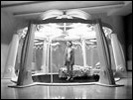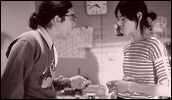Jam Films 2
- Year
- 2003
- Original title
- Jam Films 2
- Director
- Cast
- Running time
- 103 minutes
- Published
- 17 May 2004



by Tom Mes
Omnibus films have undergone something of a renaissance in recent years, particularly in Asian cinema. Makoto Shinozaki's Cop Festival (Deka Matsuri) project shows no signs of hanging up its holsters, the pan-Asian horror tryptich Three received its sequel in the shape of Three: Extremes (with Takashi Miike handling the Japanese entry, Box) and no lesser figure than Shohei Imamura contributed to the French September 11 meditation 09'11"01 September 11. Several other omnibus projects are in the works as we speak, and with the format proving to be commercially viable it's anyone's guess how long the phenomenon will continue to run.
The 2002 short film compilation Jam Films was one of the first to jump on the bandwagon in Japan. Uniting six filmmakers of established name and reputation, the results seemed exciting on the surface, but unfortunately most of the directors involved came up with little more than watered down retellings of their then current project. Ryuhei Kitamura's opening tale of a sultry Jane the Ripper was more than a bit similar to his then-current feature Sky High, George Iida delivered post-apocalyptic sci-fi in the vein of his own Dragonhead, 2LDK director Yukihiko Tsutsumi came up with another one-set dialogue driven black comedy, and Shunji Iwai did his usual girlish infantilism shtick. Only GO director Isao Yukisada and Onibi's Rokuro Mochizuki managed to stand out from the crowd with shorts that might have been variations on their earlier work, but which were at least lively and inventive.
Quality notwithstanding, the names involved guaranteed commercial success. Jam Films 2, then, was a virtual inevitability. To the credit of project mastermind Shunya Kawai, the sequel doesn't take the easy route of simply throwing together another bunch of reputable helmers, but instead allows four newcomers to show their stuff. Newcomers in the filmmaking stakes, that is, since each man has a long list of credits in the field of music video.
This certainly takes care of the danger of another collection of rehashes. With each of the four directors delivering a film of between 20 and 30 minutes, the project also demands a different mindset than the 4-minute format they are normally used to working with. This makes Jam Films 2 an in-between phase on the road to feature filmmaking, an entrance exam if you will, immediately rendering this sequel much more intriguing and ambitious than its predecessor.
If we hand out the report cards, then it's immediately clear that one member of the quartet has flunked mercilessly. Hide Inoue's Hoops Men Soul is a lazy underdog vs. villain yarn whose Nike-commercial visual style wears out its welcome in the first thirty seconds. Filled with basketball-playing Japanese hiphoppers with wardrobes straight from a Harajuku street wear store, it plays like Inoue's desperate attempt at claiming some street cred.
Eiki Takahashi's Clean Room gets points for effort, but its story of a hypersensitive girl's phobia for the world outside the plastic bubble she lives in just doesn't become interesting at any point. Aside from its lovely images, Takahashi's entry is so low key it crosses the line into being inconsequential.
Junji Kojima's opening piece Armchair Theory, on the other hand, is a laugh-a-minute comedy in the shape of a video course of pick-up techniques. In nine quick and easy lessons we get to master the "Japanese Tradition" of wooing, conquering and marrying the woman of your dreams, followed by a practical example with a sting in its tail. Armchair Theory is a funny and original approach to the format, but the question of whether Kojima is ready for the big leagues remains unanswered.
Which brings us to the only candidate to pass with flying colours, Kouki Tange. His film Fastener forms the tail end of the compilation and it's well worth sitting through Hoops Men Soul and Clean Room to see this little marvel. Taking a dying man's memory of his first kiss as its premise, Fastener deals with the impact of a child's realisation that adults spend most of their lives hiding behind a variety of disguises. Taking his inspiration from a song by pop band Mr. Children, Tange explores this concept in a succession of surrealist imagery, whose stunning beauty in no way detracts from their functionality. Leading us along subjectively distorted recollections of first experiences with sex and cigarettes, with a sidestep into the realm of TV superheroes, Fastener evokes Terry Gilliam at some moments, Tim Burton at others. Tange furthermore not only displays great sense of casting (Audition's Eihi Shiina, Ichi the Killer scribe Sakichi Sato, and Japan's leading bit actor Taro Suwa all pop up in small roles) but also shows that he can actually direct his actors.
If we give Junji Kojima the benefit of the doubt, Jam Films 2's score of two out of four may be only an average result. However, in revealing the talents of Kouki Tange to the world, the existence of this particular sequel is certainly not in vain. The prospect of seeing Tange helm a feature film in the not too distant future is a thrilling one indeed.